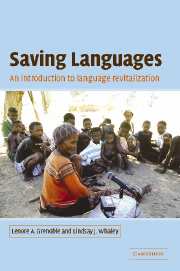4 - Case studies
Published online by Cambridge University Press: 04 December 2009
Summary
In effect, a language revitalization program is designed to change the social context in which people make choices about language use. Therefore, recognizing the particular set of variables, at both the macro-level and micro-level, that has led a language into an endangered state is pivotal in implementing a revitalization effort that has a chance of succeeding. The first three chapters each contributed to outlining a conceptual framework for understanding such variables. In order to illustrate how these variables come into play in revitalization programs, we present in this chapter four case studies. These particular cases have been chosen for a balance of geographic distribution, historical-political situation, speaker numbers and language density, type of revitalization program and the program's relative success.
First we discuss the case of Siberian native languages and the impact of the national level language policies of the Soviet Union and now of the Russian Federation. Beyond the impact of Russian, the national level language, this study also highlights the effects of multilingualism and heavy language contact at a more local level. In our analysis of Siberia we mention many different local languages, but the focus is on the Evenki language and its revitalization movement. Next we examine the Shuar language in Ecuador, which provides a very different view of language revitalization due to a different set of local and national level factors.
Information
- Type
- Chapter
- Information
- Saving LanguagesAn Introduction to Language Revitalization, pp. 69 - 101Publisher: Cambridge University PressPrint publication year: 2005
